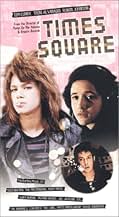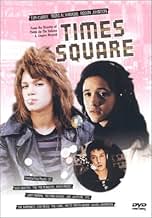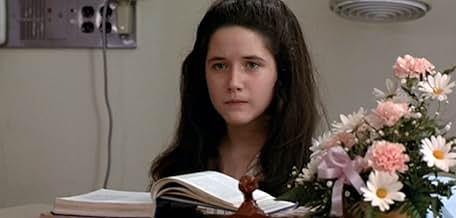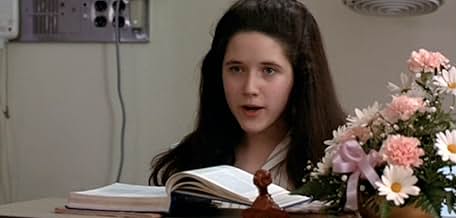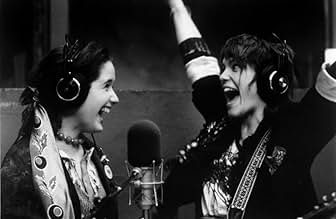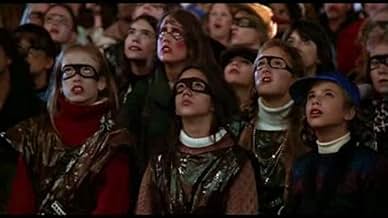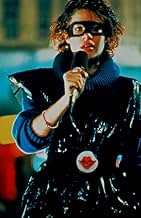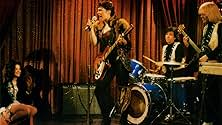ÉVALUATION IMDb
6,6/10
2,1 k
MA NOTE
Ajouter une intrigue dans votre langueTwo ill-matched teenage girls form a punk band and soon have New York City by its ears.Two ill-matched teenage girls form a punk band and soon have New York City by its ears.Two ill-matched teenage girls form a punk band and soon have New York City by its ears.
- Prix
- 2 nominations au total
Elizabeth Peña
- Disco Hostess
- (as Elizabeth Pena)
Histoire
Le saviez-vous
- AnecdotesThis movie was inspired by a diary that Writer and Director Allan Moyle found in a secondhand couch that he bought. The diary was from a young mentally disturbed woman that featured words and drawings about her life on the streets.
- GaffesIn the ambulance, Pamela Pearl turns the volume knob but the volume of the music does not change.
- Citations
Dr. Zymansky: Meth-o-dist Epis-co-pal.
Nicky Marotta: Take... a... piss... you... ass-hole!
- ConnexionsFeatured in Vintage Video: Times Square (2020)
- Bandes originalesYou Can't Hurry Love
Composed by Brian Holland (as Holland), Lamont Dozier (as Dozier), Eddie Holland (as Holland)
Performed by D.L. Byron
Courtey of Arista Records, Inc. and Stone Agate Music Division
Commentaire en vedette
I must confess up front to a favorable bias toward "Times Square". Just before its release I recall seeing the trailer and being won over by the scene in the hospital where Nikki begins eating the flowers. Since this was only about 10 seconds into the trailer it is fair to say that I immediately connected with the film. The same trailer is included with the DVD and I was happy to see that my memory of the event was accurate. After seeing the actual feature I went out and bought the double album, which I still own.
I know more about films now than I did 25 years ago and thanks to the DVD commentary (by Director Allen Moyle and Robin Johnson-who played Nikki) I now know a lot about what went into the making of "Times Square". Unfortunately Robin's co-star Trini Alvarado (Pammy) was not available for the commentary. Although most viewers consider Nikki the central character, Nikki really needs Pammy to play off (much like Charlize Theron needs Christina Ricci's reaction shots in "Monster"), plus Pammy's scenes without Nikki are some of the best in the film and Pammy is the character who undergoes all the changes in the story, so you can't really say that one of them is more important than the other.
"Times Square" suffered the same fate that Orson Welles' "The Magnificent Ambersons" did 40 years earlier. The producers took control of the final cut, re-shot some scenes, deleted others, and released a version that did not reflect the director's vision. Apparently no one has ever been able to find the deleted footage for either film. Although "Times Square" was butchered even more than "Ambersons", it seems to have been less damaged. In part that is because the originally intended version would never have approached the perfection of the original "Amberson's". Perhaps more importantly, "Times Square" has a Haskel Wexler gritty documentary style that simply transcends the narrative elements of the story. So changes to the storyline could not take away from its basic ambiance nor from its preservation of the look of 1979 Times Square-something that was even then a ghost world.
Moyle now wishes he had not left the production after a dispute over including additional songs (so they could have a double album) because his continued presence would at least have had some damage control value. Producer Robert Stigwood ("Saturday Night Fever", "Saying Alive", "Jesus Christ Superstar", Sgt. Pepper's Lonely Hearts Club Band" ) was determined to release yet another of his musical exploitation films designed to make a lot of money on the soundtrack. This accounts for the inclusion of the completely inappropriate "Help Me" (The Bee Gees), the movie actually goes out on that song although they switch to something more appropriate midway through the credits.
The commercialization of the film also included dropping all obvious hints of a lesbian relationship between the two girls. This was probably a commercial mistake because a public controversy might have actually increased attendance. Ironically, if the lesbian angle had remained Moyle would have been accused of exploitation because it is really unnecessary for the storyline. Likewise the script changes needed when Alvarado refused to dance topless saved Moyle from looking like an exploiter.
While what survives has major continuity and character development issues, the core of the story may actually work better. Two emotionally damaged girls-polar opposites- bond and help each other. It ends with Altman's cool "Kansas City" twist where the seemingly weaker girl becomes protective of the tough girl.
I like the way that Pamela's father finally gets it and backs away, letting her continue to help Nikki until she feels that Nikki can continue without her. You first realize how strong and together Nikki has made Pammy by the end of my favorite montage sequence. After ordering her out, Nikki trashes their room, tries unsuccessfully to commit suicide, and completely breaks down at the radio station. Inter-cut with this is a shot of Pammy standing outside her father's home. At the station Nikki is screaming "Pammy" over and over as they agreed to do earlier in the film in moments of total despair. The audio of these screams is extended into the morning after establishing shot of their dock building. Johnny comes into the seemingly empty room and lifts the blanket revealing a peacefully sleeping Pammy sucking her thumb-she has returned to help Nikki.
Another highlight is the scene I already mentioned of Nikki eating the flowers in their hospital room. What makes this work is its point-of-view dynamic. Moyle artfully connects us to Pammy for the first time by allowing us to see Nikki from her POV. Later he places us back into Pammy's POV as Nikki non-verbally convinces Pammy to leave the hospital with her. The hospital exit scene only works credibility-wise because the first scene set us up for it.
Finally there is Nikki's "people dig dyin on me" line.
I know more about films now than I did 25 years ago and thanks to the DVD commentary (by Director Allen Moyle and Robin Johnson-who played Nikki) I now know a lot about what went into the making of "Times Square". Unfortunately Robin's co-star Trini Alvarado (Pammy) was not available for the commentary. Although most viewers consider Nikki the central character, Nikki really needs Pammy to play off (much like Charlize Theron needs Christina Ricci's reaction shots in "Monster"), plus Pammy's scenes without Nikki are some of the best in the film and Pammy is the character who undergoes all the changes in the story, so you can't really say that one of them is more important than the other.
"Times Square" suffered the same fate that Orson Welles' "The Magnificent Ambersons" did 40 years earlier. The producers took control of the final cut, re-shot some scenes, deleted others, and released a version that did not reflect the director's vision. Apparently no one has ever been able to find the deleted footage for either film. Although "Times Square" was butchered even more than "Ambersons", it seems to have been less damaged. In part that is because the originally intended version would never have approached the perfection of the original "Amberson's". Perhaps more importantly, "Times Square" has a Haskel Wexler gritty documentary style that simply transcends the narrative elements of the story. So changes to the storyline could not take away from its basic ambiance nor from its preservation of the look of 1979 Times Square-something that was even then a ghost world.
Moyle now wishes he had not left the production after a dispute over including additional songs (so they could have a double album) because his continued presence would at least have had some damage control value. Producer Robert Stigwood ("Saturday Night Fever", "Saying Alive", "Jesus Christ Superstar", Sgt. Pepper's Lonely Hearts Club Band" ) was determined to release yet another of his musical exploitation films designed to make a lot of money on the soundtrack. This accounts for the inclusion of the completely inappropriate "Help Me" (The Bee Gees), the movie actually goes out on that song although they switch to something more appropriate midway through the credits.
The commercialization of the film also included dropping all obvious hints of a lesbian relationship between the two girls. This was probably a commercial mistake because a public controversy might have actually increased attendance. Ironically, if the lesbian angle had remained Moyle would have been accused of exploitation because it is really unnecessary for the storyline. Likewise the script changes needed when Alvarado refused to dance topless saved Moyle from looking like an exploiter.
While what survives has major continuity and character development issues, the core of the story may actually work better. Two emotionally damaged girls-polar opposites- bond and help each other. It ends with Altman's cool "Kansas City" twist where the seemingly weaker girl becomes protective of the tough girl.
I like the way that Pamela's father finally gets it and backs away, letting her continue to help Nikki until she feels that Nikki can continue without her. You first realize how strong and together Nikki has made Pammy by the end of my favorite montage sequence. After ordering her out, Nikki trashes their room, tries unsuccessfully to commit suicide, and completely breaks down at the radio station. Inter-cut with this is a shot of Pammy standing outside her father's home. At the station Nikki is screaming "Pammy" over and over as they agreed to do earlier in the film in moments of total despair. The audio of these screams is extended into the morning after establishing shot of their dock building. Johnny comes into the seemingly empty room and lifts the blanket revealing a peacefully sleeping Pammy sucking her thumb-she has returned to help Nikki.
Another highlight is the scene I already mentioned of Nikki eating the flowers in their hospital room. What makes this work is its point-of-view dynamic. Moyle artfully connects us to Pammy for the first time by allowing us to see Nikki from her POV. Later he places us back into Pammy's POV as Nikki non-verbally convinces Pammy to leave the hospital with her. The hospital exit scene only works credibility-wise because the first scene set us up for it.
Finally there is Nikki's "people dig dyin on me" line.
- aimless-46
- 14 août 2005
- Lien permanent
Meilleurs choix
Connectez-vous pour évaluer et surveiller les recommandations personnalisées
- How long is Times Square?Propulsé par Alexa
Détails
- Date de sortie
- Pays d’origine
- Site officiel
- Langue
- Aussi connu sous le nom de
- She's Got the Shakes
- Lieux de tournage
- sociétés de production
- Consultez plus de crédits d'entreprise sur IMDbPro
Box-office
- Budget
- 5 000 000 $ US (estimation)
- Durée1 heure 51 minutes
- Mixage
- Rapport de forme
- 1.85 : 1
Contribuer à cette page
Suggérer une modification ou ajouter du contenu manquant

Lacune principale
By what name was Times Square (1980) officially released in India in English?
Répondre

